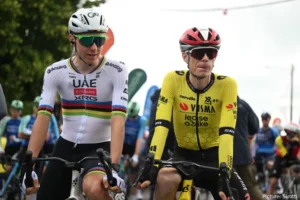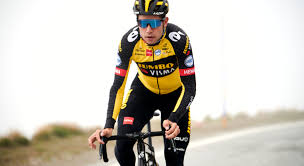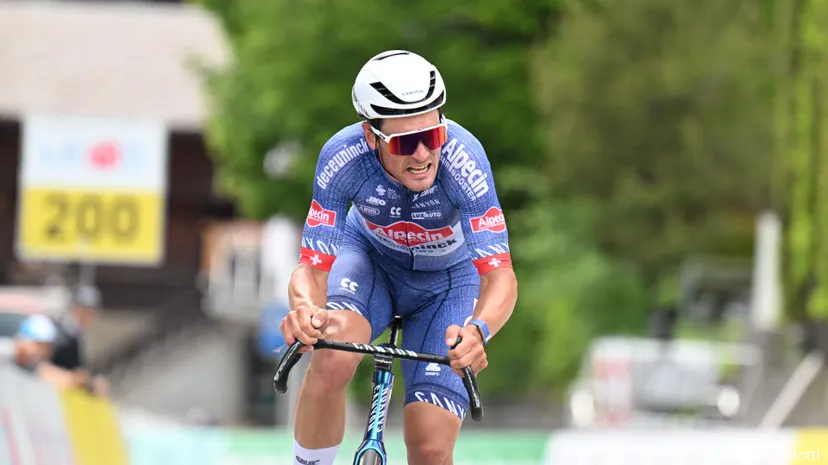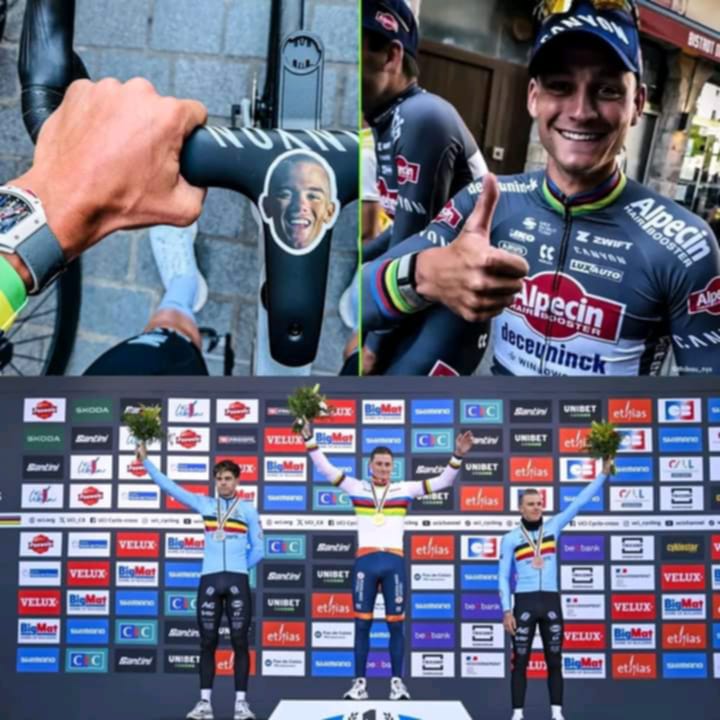**Vuelta Boss Continues Open Flirtation with Tadej Pogacar & Jonas Vingegaard: “Two Riders Arriving Fatigued from the Tour de France… Another Layer of Intrigue”**
As the cycling world prepares for the monumental showdown at the 2025 Tour de France next month, the ongoing narrative surrounding two of the sport’s brightest stars—Tadej Pogacar and Jonas Vingegaard—has taken an intriguing turn. The Vuelta a España, traditionally considered the third grand tour behind the Tour de France and Giro d’Italia, has once again become a focal point for speculation, especially with the Vuelta’s boss openly flirting with the idea of the two rivals competing later this year. This development promises to add a fascinating layer to an already compelling saga of rivalry, endurance, and strategic mastery.

A Rivalry for the Ages
Since their emergence on the professional scene, Pogacar and Vingegaard have captivated cycling fans worldwide. Their rivalry, which gained prominence during the 2021 Tour de France—where Pogacar, then just 22, shocked the cycling world by seizing the yellow jersey from Primoz Roglic and defending it against Vingegaard—has evolved into one of the most compelling narratives of the sport in recent years.
Pogacar, the Slovenian prodigy, is renowned for his aggressive racing style, exceptional climbing ability, and tactical intelligence. Vingegaard, the Danish powerhouse, counters with his resilience, climbing prowess, and strategic patience. Their contrasting styles and relentless pursuit of victory have made their duels a highlight of every race they contest.
The 2025 Tour de France: The Next Chapter
Looking ahead to next month’s Tour de France, expectations are sky-high. Both riders will be arriving after intense campaigns, with fatigue and resilience set to be critical factors. Historically, riders coming off the grueling three-week race often face diminished performance, but both Pogacar and Vingegaard have demonstrated remarkable recovery and adaptability, promising a thrilling contest.
The 2025 edition promises to be a battlefield not only of physical endurance but also of tactical ingenuity. Their rivalry has matured, with each rider learning from previous encounters, refining their strategies, and pushing their limits.
The Vuelta a España: An Unexpected Twist?
What has truly piqued the curiosity of fans and analysts alike is the Vuelta a España’s potential role in this rivalry. Traditionally, the Vuelta has been a race for climbers and all-rounders seeking late-season glory, often serving as a platform for riders to reset, test form, or seek redemption after the Tour.
However, recent comments from the Vuelta’s race director and organizers suggest a bold and somewhat unconventional idea: could Pogacar and Vingegaard line up together in Spain’s premier race later this year? This would mark a historic first, as the two have rarely competed directly against each other outside the Tour de France.
The Vuelta Boss’s Open Flirtation
In a recent interview, Javier Guillén, the director of the Vuelta a España, expressed enthusiasm about the possibility of attracting the sport’s top talents, including Pogacar and Vingegaard, to the 2025 edition. When asked about the prospects of the two rivals competing in Spain, Guillén responded with a mix of optimism and strategic openness.
*”Having Pogacar and Vingegaard in our race would be a fantastic addition. They are the kind of riders who can elevate the Vuelta to another level, and their participation would undoubtedly generate enormous interest worldwide. We are in talks with their teams, and everything is on the table,”* Guillén stated.
This openness signals a shift in the traditional approach, where top riders often prioritize the Tour and Giro, leaving the Vuelta to specialists or those seeking late-season opportunities. The Vuelta boss’s comments suggest a deliberate effort to position the race as a key battleground for the sport’s elite, especially as the cycling calendar becomes more flexible and globally competitive.
The Significance of a Vuelta Appearance
If Pogacar and Vingegaard do decide to race in Spain this year, it would have multiple implications:
1. **A Historic Duel**: Their presence together in the Vuelta would create an unprecedented rivalry, extending their battles beyond the Tour and into a different terrain and race context. It would allow fans to witness their contrasting styles in a different environment, testing resilience and tactical acumen.
2. **Strategic Shifts**: Both riders could approach the Vuelta as an opportunity to fine-tune their form, challenge each other in a different setting, or even use it as preparation for future grand tours. Their participation could influence team strategies and race dynamics significantly.
3. **Market and Media Impact**: The inclusion of these stars would undoubtedly boost viewership, sponsorship interest, and global engagement for the Vuelta. It could further elevate the race’s profile, positioning it as a true third pillar alongside the Tour and Giro.
4. **Physical and Mental Endurance**: Competing in both the Tour and Vuelta within the same season would be a testament to their resilience. Managing fatigue, recovery, and race tactics over multiple grand tours would set new standards in endurance sport.
Challenges and Considerations
Despite the excitement, several logistical and strategic challenges remain:
– **Team Strategies**: Both Pogacar and Vingegaard are integral to their teams’ grand tour ambitions. Their teams, UAE Team Emirates and Jumbo-Visma respectively, will need to weigh the risks and benefits of participating in consecutive three-week races.
– **Physical Toll**: The cumulative fatigue from back-to-back grand tours can be significant. Teams and riders will need meticulous planning for recovery and preparation to ensure peak performance.
– **Race Dynamics**: The Vuelta’s terrain and route can differ markedly from the Tour, offering new tactical opportunities and challenges. Riders and teams will need to adapt their strategies accordingly.
– **Scheduling and Priorities**: The timing of the Vuelta, typically held in late August to September, conflicts with other racing commitments and training schedules. Coordinating these elements will be crucial.
The Broader Implications for Cycling
The potential participation of Pogacar and Vingegaard in the Vuelta a España signals a broader shift in professional cycling. As the sport evolves, with increased emphasis on athlete versatility, global audiences, and innovative race formats, top riders are increasingly willing to challenge traditional boundaries.
This move could inspire other riders and teams to consider a more flexible approach to race calendars, emphasizing performance and spectacle over rigid schedules.
Moreover, it reflects a strategic effort by race organizers to attract the world’s best talent and elevate the profile of the Vuelta, traditionally seen as the “third” grand tour. By positioning itself as a premier destination for the sport’s elite, the Vuelta can strengthen its standing and appeal.
An Exciting Future
As the 2025 cycling season unfolds, the possibility of Tadej Pogacar and Jonas Vingegaard competing together at the Vuelta a España remains one of the most exciting prospects on the horizon. Their rivalry at the Tour de France will undoubtedly dominate headlines, but the potential extension of their battles into Spain could rewrite the narrative of this cycling season.
The Vuelta boss’s open flirtation indicates a strategic vision aimed at making the race a battleground for the sport’s top talents. Should these stars accept the challenge, fans will be treated to a historic showdown that tests endurance, strategy, and resilience across multiple terrains and race formats.
In the end, whether or not Pogacar and Vingegaard race together in Spain, their rivalry continues to be a defining feature of modern cycling—one that promises drama, innovation, and unforgettable moments for years to come.


